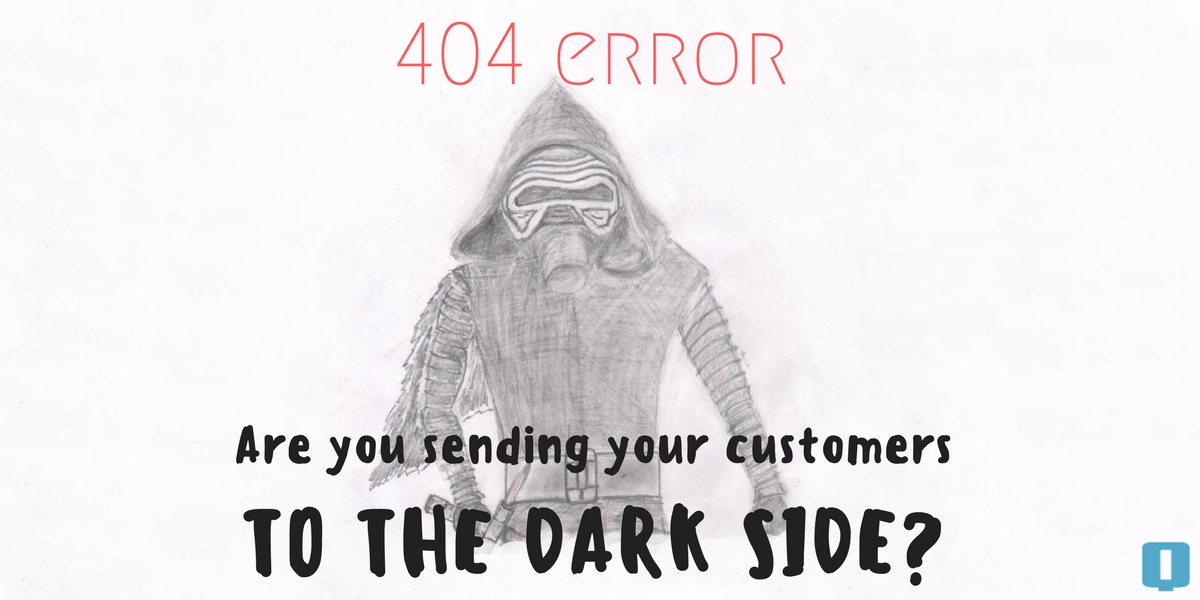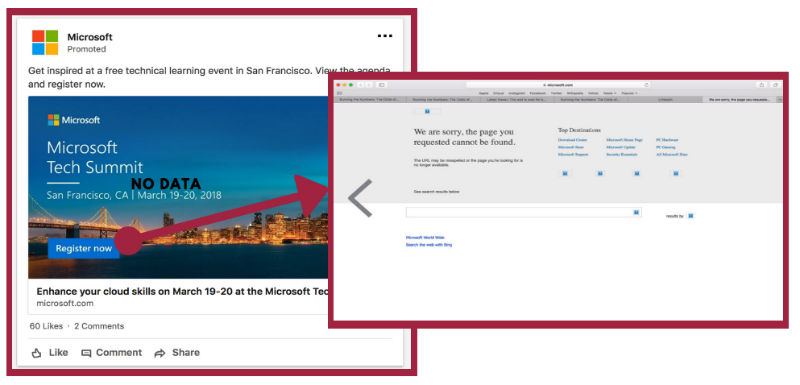The Importance of Validating Landing Pages

"...Even a great brand needs investment and caring if it is going to retain its relevance and vitality"
This was part of the introduction Steve Jobs gave back in 1997 when presenting the now iconic "Think Different" campaign. He recounted half a dozen world-class brand names, then said that the Apple brand had been suffering from neglect:
"Apple spends a fortune on advertising — you’d never know it….you’d never know it!"
What would Steve Jobs have to say about this ad spotted in March 2018? This Microsoft-sponsored post appeared in our LinkedIn feed, luring us with free registration to a local Tech Summit event in the heart of Silicon Valley. We clicked, and...

A 404 Page—and not even one of the clever ones. In fact, it appeared to be a 404 Page with broken images. What a drag!
The point is not to beat on a particular company, brand, or campaign. Nothing is perfect and no-one is perfect. Rather, the point is to examine some key takeaways:
- What is the impact of such experiences to a brand?
- What can be done to prevent these faux-pas from happening in the first place?
Brand Impact
In his famous 1997 speech, Steve Jobs talked about escaping brand neglect and the type of care needed to maintain vitality. Experiences such as the one above can do significant damage to the bottom line:
- Money was spent on the design, copy, and edits of the above advertisement. Marketing budget went towards displaying the ad to thousands, if not millions of users. You can kiss that money good-bye.
- Regardless of how many people clicked on the ad, no one registered for the advertised event while it was broken. Fewer registrations means less upsell opportunities. Granted, in this particular case, the brand involved is large enough that any losses are likely to be a drop in the bucket. But think about the ramifications if a small or a mid-size organization had dedicated a good chunk of its marketing budget to a campaign gone wrong.
- The brand takes a beating. What are the chances that users will share this promotion within their social networks in a non-ridiculing manner?
- Will users ever interact with a follow-up ad they might see from this brand? Will this type of experience increase the cost of reaching users?
- How does this impact the organization itself? Money and effort goes into an attempt to constantly optimize onsite conversation funnels. And with a single error, the top of the funnel has been slashed. Not only that, but all of the tools that rely on accurate data in order to provide the optimization recommendations now have to deal with accounting for various data anomalies introduced by sending this traffic to a 404 page.
What Can You Do About It?
This example is far from an isolated incident. Marketers today have to navigate an increasingly complex system, managing hundreds, if not thousand of promotions, across multiple platforms and partners. If trying to do this manually without the help of automation, errors are almost guaranteed.
Through our partnership with TrackingFirst, a pioneer in the data governance space, QA2L's API is used to automatically validate landing pages by some of the biggest brands across all industries (pharmaceuticals, insurance, banking, and technology, among others). Marketers use our platform to validate landing URLs before they are sent to production, passing several layers of checks. And looking at the data, there is good reason to do so. Over the month of February, our system validated roughly 12,000 URLs, detecting the following issues:
- Malformed URLs. In 3 percent of the cases, we encountered issues with the URLs being malformed, so marketers were able to catch said 404's in advance.
- Tags not firing correctly. In more than 60 percent of the cases, the tag that was expected to fire on the landing page was not firing correctly. In other words, in 6 out of 10 cases we were able to alert marketers that they need to adjust the landing URLs in order to maximize the effectiveness of their campaigns.
- Driving traffic to PDF documents. In some more complex cases, we discovered that marketers are attempting to drive traffic to PDF documents, which usually means that the uplift generated by the campaign cannot be fully measured since most campaign tracking solutions rely on JavaScript.
- Redirects. Some of the other inconsistencies we recorded included detecting redirects. This is important because if your landing page is a redirect page, various precautions need to be taken to make sure that the ultimate landing pages is valid, carries over the various campaign code, and is properly tagged.
- Social media sites. Another interesting case includes landing URLS that lead to various social media sites, where again tracking uplift and attribution to the specific campaign may not be as straightforward as driving traffic to the brand's own web properties.
"We built Tracking First to help marketers see what was actually happening with each of their digital campaigns,” added Craig Scribner, Tracking First Founder and CEO. “By being able to determine which campaigns are generating results, our users can fix issues and consistently improve their campaigns over time.”
In summary, the management of complex marketing campaigns requires at the very minimum a series of basic checks:
- Does the page exist? Is it the expected page?
- Does the page contain the correct campaign tracking code? Is this code correctly attributed to the higher level traffic acquisition rollups/marketing channels?
- Does the tracking on the page fire the expected pixels to accurately capture activity associated with the campaign?
In the ever-expanding universe of marketing, performing such checks manually and maintaining information about them in spreadsheets is rarely a viable option. There is not enough time in the day to manually verify thousands of unique landing URLs.
But we now have automation technology that can do a lot of the heavy lifting when it comes to automated verification, and it can free up humans to concentrate on decisions and ideas that propel their business and their brand forward.